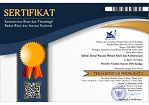Contribution of Islamic law in the discretionary scheme that has implications for corruption
Abstract
Keywords
Full Text:
PDFReferences
Adami, C. (2005). Hukum Pidana Materiil dan Formil Korupsi di Indonesia. Malang: CV. Bayu Media.
Al-Bajuri, I. (n.d.). Hasyah Syeh Ibrohim Al Bajuri (Juz 2). Beirut: Darul Fiqr.
Allolangi, Y. R. (2014). Kepemimpinan Transformasional sebagai Kepemimpinan Dakwah. Jurnal Ilmu Dakwah, 6(1), 151. https://doi.org/10.15575/jid.v6i1.331
Anshori, A. (2016). Konsep Siyasah dalam Yahudi dan Islam. Asy-Syir’ah: Jurnal Ilmu Syari’ah Dan Hukum, 6(1), 186. Retrieved from http://www.asy-syirah.uin-suka.com/index.php/AS/article/view/169
Arif, B. N. (2014). Bunga Rampai Kebijakan Hukum Pidana (7th ed.). Jakarta: Kencana.
Arifin, B., & Said, A. (1981). Rahasia Ketahanan Mental dan Bina Mental dalam Islam. Surabaya: Al-Ikhlas.
As-Syafi’i, A. sayid A. B. al A. A. Y. (1412). Al Faraidul Bahiyyah fil qowaidil fiqhi. Ploso, Kediri: Al Ma’had wal Madrasah Al Islamiyah Assalafi.
Asy Suyuti, J. A. (1995). Al Asybah wa NadhoirAl Asybah wa Nadhoir. Beirut: Darul Fikr.
Atmosudirjo, S. P. (1994). Hukum Administrasi Negara (Cet. 10). Jakarta: Ghalia Indonesia.
Audah, A. al-Q. (n.d.). al-Tasyri al-Jinai al Islami Muqorinnan bi al-Qanun al-Wad’i (2nd ed.). Beirut: Darul Kitab al-Arabi.
Basah, S. (1992). Perlindungan hukum terhadap sikap-tindak administrasi negara. Bandung: Alumni.
Bisri, M. A. (1977). Terjemahan al Faraidul Bahiyyah. Kudus: Menara Kudus.
Budiharto, S., & Himam, F. (2006). Konstruk Teoritis dan Pengukuran Kepemimpinan Profetik. Jurnal Psikologi (Yogyakarta), 33(2), 133–145. https://doi.org/10.22146/jpsi.7081
Engineer, A. A. (2000). Devolusi Negara Islam. Yogyakarta: Pustaka Pelajar.
Fathony, A. (2018). Maqashid Al-Syariah Sebagai Konsep Dasar Dalam Teori Pembentukan Hukum Islam Di Indonesia. Jurnal Islam Nusantara, 2(2), 269. https://doi.org/10.33852/jurnalin.v2i2.103
Githa Angela Sitohang. (2017). Tugas Dalam Situasi Darurat. Diskresi Dan Tanggung Jawab Pejabat Publik Pada Pelaksanaan Tugas Dalam Situasi Darurat, 13(1), 61–65.
Hart, M. H. (2001). Seratus Tokoh yang Paling Berpengaruh dalam Sejarah. https://doi.org/5432gf
Huda, N. (2016). STUDI FATWA MAJELIS TARJIH TENTANG MEROKOK. At-Tuhfah, 5(9), 134–151.
Indarti, E. (2010). Diskresi dan Paradigma. Pidato Guru Besar, (November).
Jumali, E. (2014). Penerapan Sanksi Pidana Ta‘Zîr Bagi Pelaku Tindak Pidana Korupsi Di Indonesia. Asy-Syari’ah, 16(2). https://doi.org/10.15575/as.v16i2.631
Khalilurrahman. (2013). Konsep Implementasi Dimensi Afektif-Spiritual bagi Auditor dan Aparatur. Jurnal Fokus Pengawasan, 10 (3).
Kpk.go.id. (n.d.). tindak pidana korupsi.
Liebling, A, P. officers. (2000). policing and the use of discretion. Theoretical Criminology, 4(3), pp.333-357.
Mahfud, M. (2007). Politik Hukum Dalam Perda Berbasis Syari ’ ah. 14(1), 1–21.
Mahfud MD, M. (2017). Membangun Politik Hukum Menegakkan Konstitusi. Jakarta: Rajawali Press.
Marwan, M. (2014). Pemberantasan Tindak Pidana Korupsi. Bogor: Ghalia Indonesia.
Mawardi, A., & Habib, A. bin. (1982). An-Nukat Wal Uyun (4th ed.). Kuwait: Wizarat al-auqaf wa as-syu’un al-Islamiyah.
Mudjib, H. A. (2001). Kaidah kaidah ilmu fiqih:(Al-Qowa’idul Fiqhiyyah). Kalam Mulia.
Mudofir. (2019). Menegaskan Fikih Anti-Korupsi untuk Pembangunan Bangsa : Perspektif Filsafat Hukum Islam. Ejournal.Fiaiunisi, 6 (1)., 1–23.
Natasasmita, B. I. (2011). Diskresi sebagai Tindak Pidana Korupsi: Kajian Kriminologi dan Hukum terhadap Fenomena Pejabat Otoritas. MIMBAR, Jurnal Sosial Dan Pembangunan, 27(2), 143–149.
Nurhayati, R., & Gumbira, S. W. (2017). PERTANGGUNGJAWABAN PUBLIK DAN TINDAK PIDANA KORUPSI RESPONSIBILITY PUBLIC OFFICIALS AND CORRUPTION. Jurnal Hukum Dan Peradilan, 6, 41–66.
Personal, M., Archive, R., Henk, L. M., Kyvik, H., & Analysis, E. P. (2007). Legal Corruption. Economic Policy, (2116), 0–33. https://doi.org/10.1227/01.NEU.0000349921.14519.2A
Perwadarminta, W. J. . (2001). Kamus Besar Bahasa Indonesia. Jakarta: Balai Pustaka.
Pound, R. (2017). Social control through law (3rd ed.). New York: Routledge.
Rahardjo S. (2010). Penegakan Hukum Progresif. Jakarta: Kompas.
Satria, H. (2017). Ke Arah Pergeseran Beban Pembuktian. Integritas: Jurnal Antikorupsi Komisi Pemberantasan Korupsi, Vol.3 No.1.
Shihab, Q. (2006). Tafsir Al Misbah (1st ed.). Jakarta: Lentera Hati.
Sinamo, N. (2010). Hukum administrasi negara: suatu kajian kritis tentang birokrasi negara. Jakarta: Jala Permata Aksara.
Subhi, M. (1981). Falsafah al-Tasyri’ fī al-Islam, Dar al-‘Ilm li al-Malayīn (V). Lebanon: Beirut.
Syamsudin, R. (2014). Strategi dan Etika Dakwah Rasulullah SAW. Ilmu Dakwah: Academic Journal for Homiletic, 4(14), 793–808. https://doi.org/10.15575/idajhs.v4i14.422
Weber, M. (1968). On charisma and institution building. University of Chicago Press.
Zaidan, A. K. (1990). Al-Wajiz fi ushul fiqh. Beirut.
Zulaekah, S., Yuli Kusumawati, Ilmu, F., Universitas, K., & Surakarta, M. (2005). Halal Dan Haram Makanan Dalam Islam. Suhuf, XVII(1), 25–35.
DOI: https://doi.org/10.18326/ijtihad.v19i2.147-167
Refbacks
- There are currently no refbacks.

This work is licensed under a Creative Commons Attribution-ShareAlike 4.0 International License.
Ijtihad: Jurnal Wacana Hukum Islam dan Kemanusiaan by http://ijtihad.iainsalatiga.ac.id/ is licensed under a Creative Commons Attribution-ShareAlike 4.0 International License







